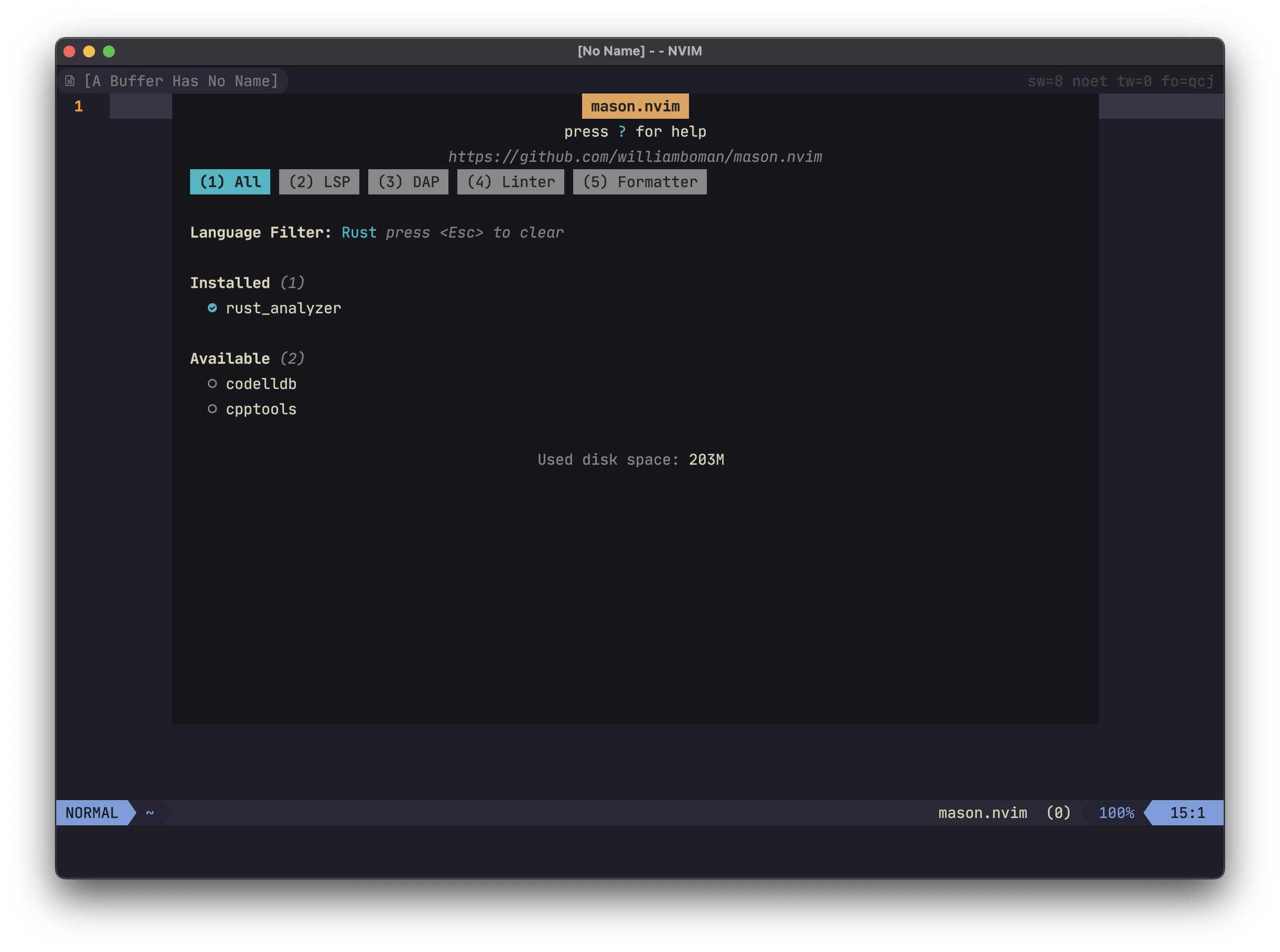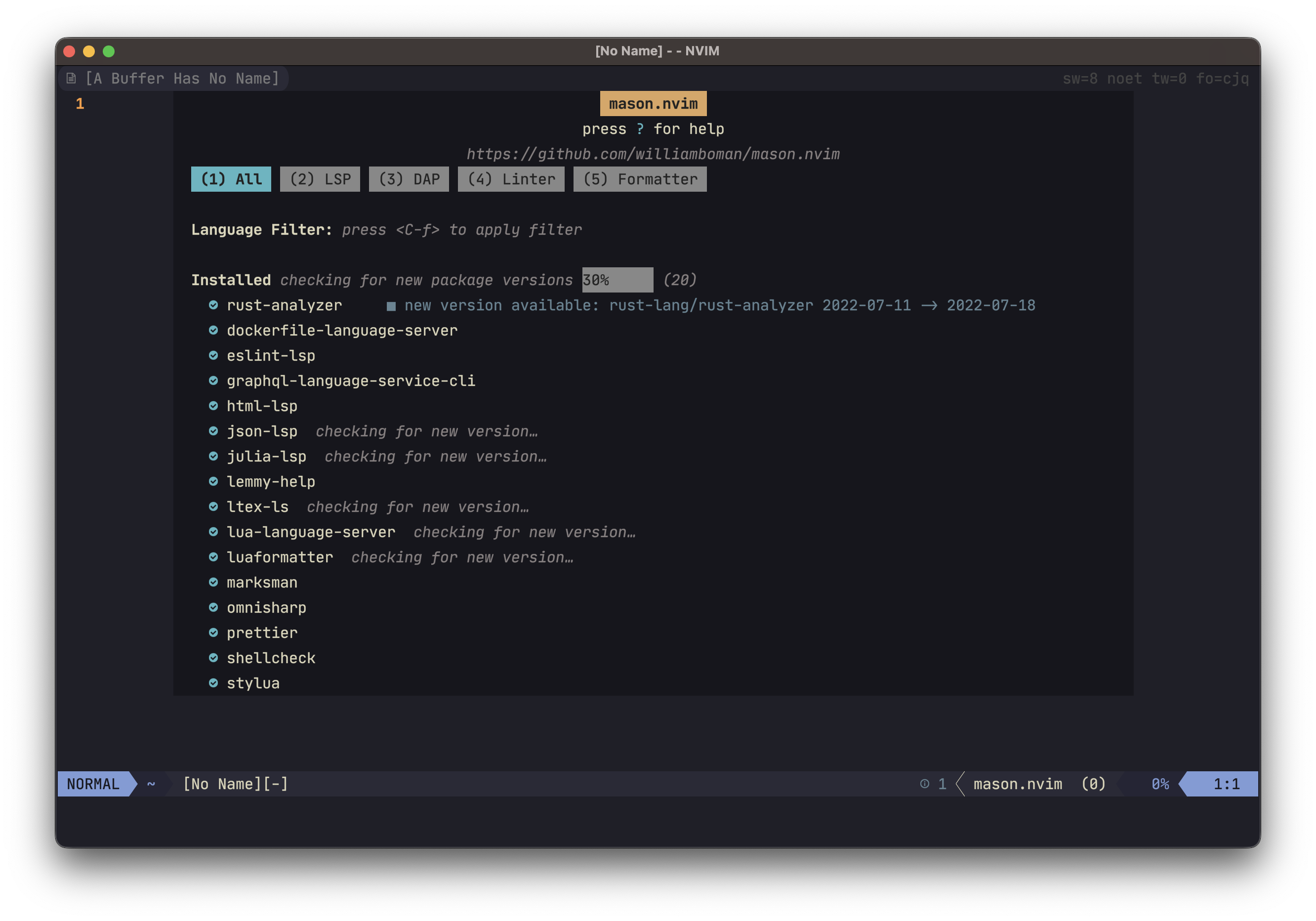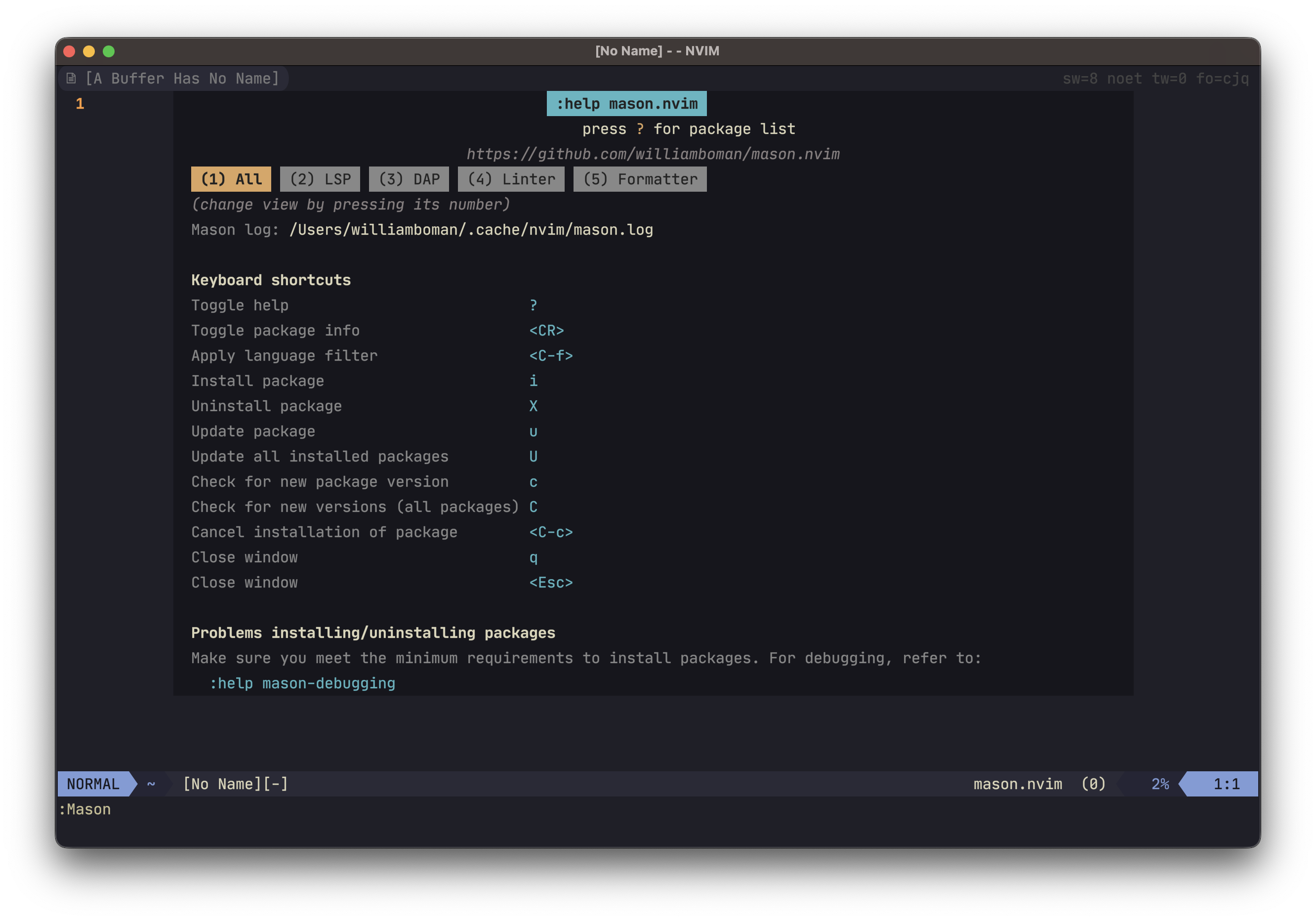Portable package manager for Neovim that runs everywhere Neovim runs.
Easily install and manage LSP servers, DAP servers, linters, and formatters.
:help mason.nvim
Latest version: v1.10.0
mason.nvim is a Neovim plugin that allows you to easily manage external editor tooling such as LSP servers, DAP servers,
linters, and formatters through a single interface. It runs everywhere Neovim runs (across Linux, macOS, Windows, etc.),
with only a small set of external requirements needed.
Packages are installed in Neovim's data directory (:h standard-path) by default. Executables are
linked to a single bin/ directory, which mason.nvim will add to Neovim's PATH during setup, allowing seamless access
from Neovim builtins (shell, terminal, etc.) as well as other 3rd party plugins.
For a list of all available packages, see https://mason-registry.dev/registry/list.
Although many packages are perfectly usable out of the box through Neovim builtins, it is recommended to use other 3rd party plugins to further integrate these. The following plugins are recommended:
- LSP:
lspconfig&mason-lspconfig.nvim - DAP:
nvim-dap&nvim-dap-ui - Linters:
null-ls.nvimornvim-lint - Formatters:
null-ls.nvimorformatter.nvim
 |
 |
 |
 |
 |
 |
mason.nvim relaxes the minimum requirements by attempting multiple different utilities (for example, wget,
curl, and Invoke-WebRequest are all perfect substitutes).
The minimum recommended requirements are:
- neovim
>= 0.7.0 - For Unix systems:
git(1)curl(1)orwget(1)unzip(1)- GNU tar (
tar(1)orgtar(1)depending on platform) gzip(1)
- For Windows systems:
Note that mason.nvim will regularly shell out to external package managers, such as cargo and npm. Depending on
your personal usage, some of these will also need to be installed. Refer to :checkhealth mason for a full list.
use {
"williamboman/mason.nvim"
}{
"williamboman/mason.nvim"
}Plug 'williamboman/mason.nvim'require("mason").setup()mason.nvim is optimized to load as little as possible during setup. Lazy-loading the plugin, or somehow deferring the
setup, is not recommended.
Refer to the Configuration section for information about which settings are available.
Refer to the Wiki for a list of 3rd party extensions.
mason-lspconfig.nvim- recommended for usage withlspconfig
:Mason- opens a graphical status window:MasonUpdate- updates all managed registries:MasonInstall <package> ...- installs/re-installs the provided packages:MasonUninstall <package> ...- uninstalls the provided packages:MasonUninstallAll- uninstalls all packages:MasonLog- opens themason.nvimlog file in a new tab window
Mason's core package registry is located at mason-org/mason-registry.
Before any packages can be used, the registry needs to be downloaded. This is done automatically for you when using the
different Mason commands (e.g. :MasonInstall), but can also be done manually by using the :MasonUpdate command.
If you're utilizing Mason's Lua APIs to access packages, it's recommended to use the
:h mason-registry.refresh() and/or :h mason-registry.update()
functions to ensure you have the latest package information before retrieving packages.
You may optionally configure certain behavior of mason.nvim when calling the .setup() function. Refer to the
default configuration for a list of all available settings.
Example:
require("mason").setup({
ui = {
icons = {
package_installed = "✓",
package_pending = "➜",
package_uninstalled = "✗"
}
}
})---@class MasonSettings
local DEFAULT_SETTINGS = {
---@since 1.0.0
-- The directory in which to install packages.
install_root_dir = path.concat { vim.fn.stdpath "data", "mason" },
---@since 1.0.0
-- Where Mason should put its bin location in your PATH. Can be one of:
-- - "prepend" (default, Mason's bin location is put first in PATH)
-- - "append" (Mason's bin location is put at the end of PATH)
-- - "skip" (doesn't modify PATH)
---@type '"prepend"' | '"append"' | '"skip"'
PATH = "prepend",
---@since 1.0.0
-- Controls to which degree logs are written to the log file. It's useful to set this to vim.log.levels.DEBUG when
-- debugging issues with package installations.
log_level = vim.log.levels.INFO,
---@since 1.0.0
-- Limit for the maximum amount of packages to be installed at the same time. Once this limit is reached, any further
-- packages that are requested to be installed will be put in a queue.
max_concurrent_installers = 4,
---@since 1.0.0
-- [Advanced setting]
-- The registries to source packages from. Accepts multiple entries. Should a package with the same name exist in
-- multiple registries, the registry listed first will be used.
registries = {
"github:mason-org/mason-registry",
},
---@since 1.0.0
-- The provider implementations to use for resolving supplementary package metadata (e.g., all available versions).
-- Accepts multiple entries, where later entries will be used as fallback should prior providers fail.
-- Builtin providers are:
-- - mason.providers.registry-api - uses the https://api.mason-registry.dev API
-- - mason.providers.client - uses only client-side tooling to resolve metadata
providers = {
"mason.providers.registry-api",
"mason.providers.client",
},
github = {
---@since 1.0.0
-- The template URL to use when downloading assets from GitHub.
-- The placeholders are the following (in order):
-- 1. The repository (e.g. "rust-lang/rust-analyzer")
-- 2. The release version (e.g. "v0.3.0")
-- 3. The asset name (e.g. "rust-analyzer-v0.3.0-x86_64-unknown-linux-gnu.tar.gz")
download_url_template = "https://github.com/%s/releases/download/%s/%s",
},
pip = {
---@since 1.0.0
-- Whether to upgrade pip to the latest version in the virtual environment before installing packages.
upgrade_pip = false,
---@since 1.0.0
-- These args will be added to `pip install` calls. Note that setting extra args might impact intended behavior
-- and is not recommended.
--
-- Example: { "--proxy", "https://proxyserver" }
install_args = {},
},
ui = {
---@since 1.0.0
-- Whether to automatically check for new versions when opening the :Mason window.
check_outdated_packages_on_open = true,
---@since 1.0.0
-- The border to use for the UI window. Accepts same border values as |nvim_open_win()|.
border = "none",
---@since 1.0.0
-- Width of the window. Accepts:
-- - Integer greater than 1 for fixed width.
-- - Float in the range of 0-1 for a percentage of screen width.
width = 0.8,
---@since 1.0.0
-- Height of the window. Accepts:
-- - Integer greater than 1 for fixed height.
-- - Float in the range of 0-1 for a percentage of screen height.
height = 0.9,
icons = {
---@since 1.0.0
-- The list icon to use for installed packages.
package_installed = "◍",
---@since 1.0.0
-- The list icon to use for packages that are installing, or queued for installation.
package_pending = "◍",
---@since 1.0.0
-- The list icon to use for packages that are not installed.
package_uninstalled = "◍",
},
keymaps = {
---@since 1.0.0
-- Keymap to expand a package
toggle_package_expand = "<CR>",
---@since 1.0.0
-- Keymap to install the package under the current cursor position
install_package = "i",
---@since 1.0.0
-- Keymap to reinstall/update the package under the current cursor position
update_package = "u",
---@since 1.0.0
-- Keymap to check for new version for the package under the current cursor position
check_package_version = "c",
---@since 1.0.0
-- Keymap to update all installed packages
update_all_packages = "U",
---@since 1.0.0
-- Keymap to check which installed packages are outdated
check_outdated_packages = "C",
---@since 1.0.0
-- Keymap to uninstall a package
uninstall_package = "X",
---@since 1.0.0
-- Keymap to cancel a package installation
cancel_installation = "<C-c>",
---@since 1.0.0
-- Keymap to apply language filter
apply_language_filter = "<C-f>",
---@since 1.1.0
-- Keymap to toggle viewing package installation log
toggle_package_install_log = "<CR>",
---@since 1.8.0
-- Keymap to toggle the help view
toggle_help = "g?",
},
},
}👋 didn't find what you were looking for? Try looking in the help docs
:help mason.nvim!




